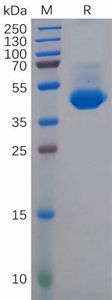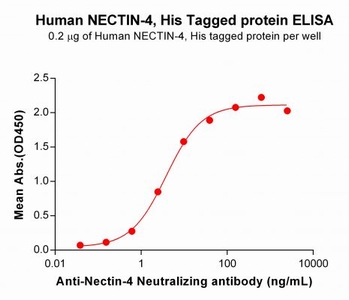| 目录: 11649 |
| 产品名称: Human NECTIN-4 Protein |
| 规格: 10 µg, 50 µg and 100 µg |
| 基因符号: EDSS1;LNIR;nectin-4;PRR4;PVRL4 |
| Target: Nectin-4 |
| UNIPROT ID: Q96NY8 |
| 描述: Recombinant human NECTIN-4 protein with C-terminal 6xHis tag |
| 背景: This gene encodes a member of the nectin family. The encoded protein contains two immunoglobulin-like (Ig-like) C2-type domains and one Ig-like V-type domain. It is involved in cell adhesion through trans-homophilic and -heterophilic interactions. It is a single-pass type I membrane protein. The soluble form is produced by proteolytic cleavage at the cell surface by the metalloproteinase ADAM17/TACE. The secreted form is found in both breast tumor cell lines and breast tumor patients. Mutations in this gene are the cause of ectodermal dysplasia-syndactyly syndrome type 1, an autosomal recessive disorder. Alternatively spliced transcript variants have been found but the full-length nature of the variant has not been determined.[provided by RefSeq, Jan 2011] |
| Species/Host: HEK293 |
| Molecular Weight: The protein has a predicted molecular mass of 34.9 kDa after removal of the signal peptide.The apparent molecular mass of NECTIN-4-His is approximately 35-55 kDa due to glycosylation. |
| Molecular Characterization: NECTIN-4(Gly32-Ser349) 6×His Tag |
| 纯化:: The purity of the protein is greater than 85% as determined by SDS-PAGE and Coomassie blue staining. |
| Formulation & Reconstitution: Lyophilized from nanodisc solubilization buffer (20 mM Tris-HCl, 150 mM NaCl, pH 8.0). Normally 5% – 8% trehalose is added as protectants before lyophilization. |
| 储存和运输: Store at -20°C to -80°C for 12 months in lyophilized form. After reconstitution, if not intended for use within a month, aliquot and store at -80°C (Avoid repeated freezing and thawing). Lyophilized proteins are shipped at ambient temperature. |

Figure 1. Human NECTIN-4 Protein, His Tag on SDS-PAGE under reducing condition. | 
Figure 2. ELISA plate pre-coated by 2 µg/ml (100 µl/well) Human NECTIN-4 Protein, His Tag (11649) can bind Nectin-4 Neutralizing antibody 28091 in a linear range of 0.61-39.06 ng/mL. |
|












